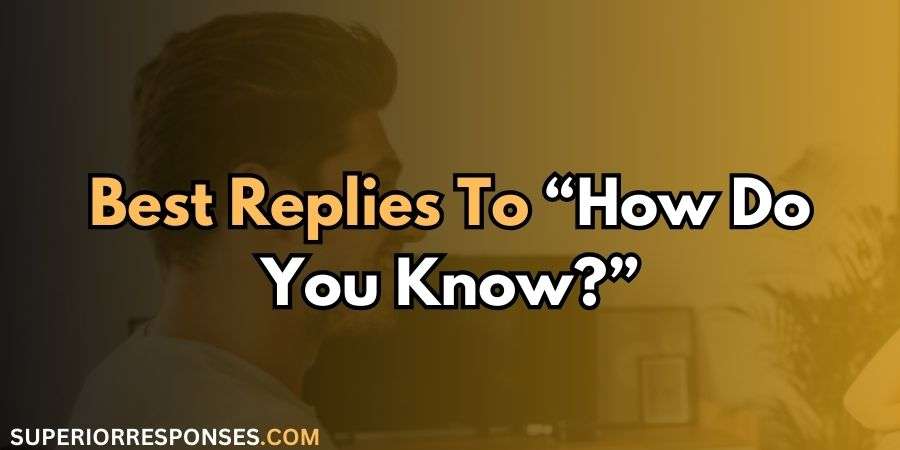When someone asks you, ‘How do you know?’ it often shows their keen excitement or doubt about the subject. A good handle on the topic indeed feels critical to explain your understanding. But, there are times when you don’t want to share, can’t fully articulate your backstory, or they might not grasp the information. This question is not just about what you know; it’s about gauging whether you have a deep experience with the subject or something more.
On the other hand, it may be an insult. That’s why we have also collected some great responses to the question ‘How do you know?’ in case it is disrespectful and belittles your knowledge.
Contents
Answers To “How Do You Know?”
Honest Replies
1. Just a hunch, mixed with a bit of experience.
You’re being real about where your knowledge comes from. It’s living intelligence, not just book intelligence.
You’ve probably been in similar situations before, and you’re using that to make a guess now.

2. I like to keep up with such topics.
You’re into knowing stuff. It’s not just random knowledge; you actually find these things interesting.
It’s like you’ve got this curiosity and you feed it by staying updated.
3. It’s something I’ve wondered about too.
This reply is really relatable. It’s like you’re saying, Hey, I’m curious just like you. You don’t act as if you’re aware of everything.
You’re a thinker, someone who ponders stuff.
SUGGESTED: Funny, Flirty & Heartful Responses To “What Are You Up To?”
Funny/Light-Hearted Teasing Replies
1. I’m BFF with Google, Siri, and Alexa. They tell me everything.
Google, Siri, and Alexa hanging out like the best buddies ever.
You’re the ultimate gossip gang! While they’re wondering about the world, You’re getting all the juicy info from your tech pals.
Google’s like the know-it-all, Siri’s the cool one with an answer for everything, and Alexa? She’s the secret keeper.
2. I have a PhD in Know-ology!
I was the star student, always with my hand up, answering questions about everything from kangaroos to constellations.
It’s all in good fun, but hey, maybe I do know a thing or two!
3. I bribed a time traveler for the answer.
So there I was, meeting a time traveler. Sounds crazy, right? I lured him a chocolate bar – his favorite, from the future, of course.
In exchange, he whispered secrets from tomorrow, next week, and even next year.
4. I’ve got a spy owl. He tells me everything.
Ever heard of a spy owl? Well, now you have. He’s my little winged informant, always on the lookout.
Nighttime’s his prime time, swooping around, gathering gossip.
When you wonder how I know something, just picture my owl, perched on my shoulder, whispering secrets.
5. Been studying with Detective Pikachu. Picked up a few tips.
There’s you and Detective Pikachu, side by side, cracking cases. He’s small, yellow, but super smart.
You’re like a detective duo from a cartoon, solving mysteries over a cup of coffee.
6. My best friend’s cousin’s barber’s dog walker told me.
You wouldn’t believe the kind of things you can learn just by listening to the tales of a dog walker who hears it all from the diverse folks around town.
Romantic Replies
1. Our hearts speak a language only we understand.
You know it’s special between us. It’s like our hearts have their secret conversation. It’s only us that realize it.
We don’t need words. Our hearts do all the talking. That’s how I know.

2. You’re in every beat of my heart, that’s how.
It’s not just a feeling. It’s more, way more.
Even when you’re not here, you’re here. In my heart, always. That constant beat, it’s you. It’s why I know.
3. When you’re near, everything else fades away.
The world blurs, and there’s just you.
It’s like being in a bubble, just us. That feeling, it’s unmistakable.
4. Every ‘I love you’ from you confirms it.
Every time you say those three words, it’s reaffirmed. It’s not routine, it’s a revelation. Each ‘I love you’ hits deep. It’s like a promise, renewed.
These three words are the reason I know.
Counter Questioning Replies
1. Why wouldn’t I know about this?
You’re throwing the surprise back at them. It’s like saying, ‘Hey, what’s so shocking about me knowing this?’
You’re making it clear that you’re not someone who’s out of the loop.
It’s a bit sassy, right?
2. Why does it surprise you that I know this?
You’re asking them, ‘What’s so special about this info that you think I wouldn’t know it?’ It’s a bit cheeky.
You’re gently hinting that maybe they’re the ones who are out of touch, not you.
READ MORE: 21 Best Comebacks When Someone Calls You A Piece Of Work
3. Why, do you have information suggesting otherwise?
Now, this is a bit more on the defensive side but still frank.
You’re throwing a bit of suspicion their way, more like saying, ‘Are you hiding something? Why are you doubting me?’
What To Answer To “How Do You Know”?
When asked, ‘How do you know?’ my response often depends heavily on the context and the specific goal of the conversation. In situations where facts and information are vital, I express my firm opinion and share the source of my knowledge.
For instance, if it’s about a detail I’m confident in, I’ll say, ‘I know because the data suggests,’ or ‘My experience in this area tells me.’ This approach not only solidifies my claim but also offers a perfect answer to satisfy the nature of their doubt.
To convince someone who wants to know more, I provide specific examples and briefly mention sources and evidence behind the information I share. Illustrating my point with concrete examples helps to adapt to the situation, making my explanation more believable.
Additionally, I often offer further resources, like helpful articles, statistics, or research papers, to back up my claims. It’s a way to always ensure everything I say is backed by solid information and no one is left with any doubt about the reliability of my knowledge.
How Should You Respond To People Who Question Your Knowledge?
Understanding Motives Behind Questions
When faced with questioning about your knowledge, it’s important to understand the motive behind the inquiry. If someone is genuinely curious or seeking clarification, responding with appreciation and thanking them for the opportunity to engage in an open discussion can set a positive tone.
A productive conversation often begins with learning about the other person’s viewpoint or perspective.
Responding with Evidence and Openness
It’s crucial to remain calm and confident if you encounter doubt or feel challenged. Explain your reasoning with evidence, support, data, citations, and examples from personal experiences.
Being honest when you’re unsure and admitting it can also be a sign of being an expert on the topic, as it shows a willingness to research further and fosters a collaborative and constructive approach.
Sometimes, discussion can become subjective, leading to claiming truths without respectful debate. In such cases, defuse the tension with humor, a light-hearted joke or quip, but cautiously.
Seek clarification if you’re unsure, asking if you have the right information. Know when to walk away from a conversation that becomes unproductive or disrespectful.
Maintaining Professionalism and Respect in Conversations
Lastly, always maintain a positive, professional tone. Avoid personal attacks, assumptions, or questioning motivations. Instead, focus on being knowledgeable and open to learning.

Validate their concern if they need clarification and ask for feedback to ensure a respectful exchange of ideas.
Final Thoughts
Responding to ‘How do you know’ often stirs a mix of confusion and curiosity. When someone questions your knowledge, it’s not just about accepting your answer; it’s a challenge to your thinking and experience.
My extensive experience in learning new things has taught me that people aren’t always curious—sometimes they doubt you and need confirmation.
I’ve found that a logical yet slightly sarcastic reply can help to create a funny situation, easing any tensions and showing that I really do know my stuff.
It’s important to understand why someone wants to know if you really know something. Often, they don’t want to feel left out or are doubting their own understanding.
In these moments, answers that are both logical and a bit funny can explain things better and clear up any doubts.
This approach not only helps in accepting the knowledge shared but also in learning how to tackle such questions more effectively.

